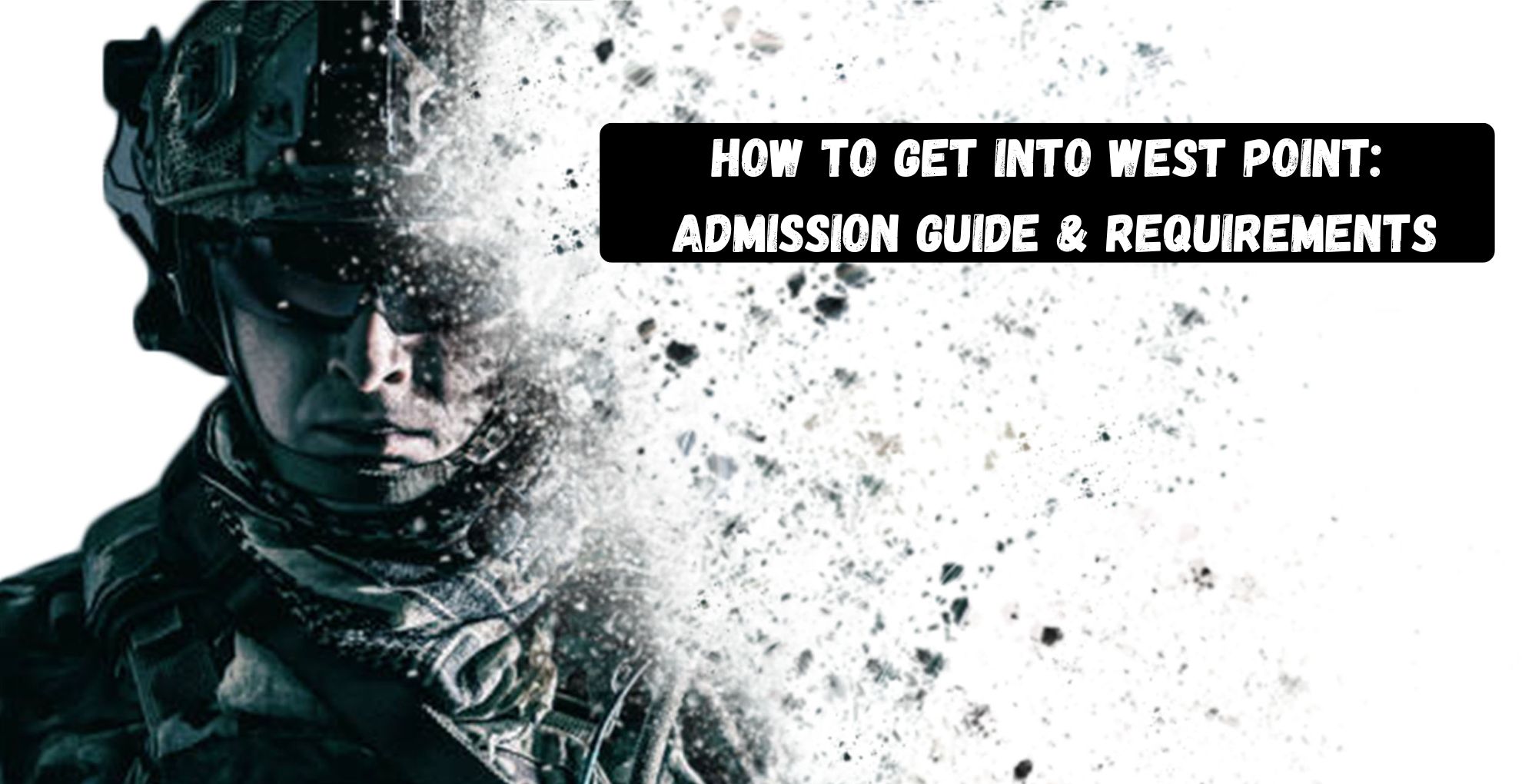West Point might be calling your name if you have ever aspired to join the U.S. Army, receive a top-notch education, and graduate from one of the most prestigious universities in the nation. It’s not easy to get in, though. It has strict academic, athletic, and leadership requirements, making it one of the most competitive universities in the United States.
How does one enter West Point, then? From completing the eligibility checklist to writing essays, completing fitness tests, and receiving a nomination, this guide will help you every step of the way. This article is your comprehensive guide to enrolling in the United States Military Academy as a cadet, regardless of whether you’re starting high school or approaching the conclusion of your junior year.
What Is West Point?
An Overview of the U.S. Military Academy
Founded in 1802 and located in West Point, New York, the United States Military Academy—better known as West Point—is more than just a college. It’s a leadership institution designed to educate, train, and inspire the next generation of Army officers. It’s also one of five U.S. service academies, offering a four-year program where students, known as cadets, receive a fully funded education in exchange for military service after graduation.
Why Choose West Point?
West Point offers something few other schools can: a full-ride scholarship combined with a guaranteed leadership role in the U.S. Army. Upon graduation, cadets receive a commission as a Second Lieutenant. Beyond the financial benefits, the academy builds character, discipline, and resilience in ways few civilian institutions can match.
But this path isn’t for everyone. The experience is intense—physically, mentally, and emotionally. Cadets wake up early for military drills, attend rigorous academic classes, and uphold strict codes of conduct. Yet, for those truly called to serve, it’s a life-changing journey.

How Competitive Is West Point?
West Point Acceptance Rate
With an acceptance rate of just 12%, West Point is among the most selective colleges in the country. It’s not just about academic achievement—applicants are evaluated on leadership potential, physical fitness, moral character, and commitment to service. Admissions officers are looking for well-rounded individuals ready to rise to the academy’s demanding standards.
What Makes West Point Unique?
Unlike other colleges, West Point assesses applicants through a mix of traditional metrics like GPA and test scores, along with military-specific criteria. Applicants undergo a Candidate Fitness Assessment, a medical exam through DoDMERB, and must secure a nomination from a member of Congress or other qualified authority.
Basic Eligibility Requirements
Who Can Apply?
Before diving into applications and exams, you need to make sure you meet the basic eligibility criteria:
- Be a U.S. citizen
- Be at least 17 but not yet 23 years old on July 1 of your admission year
- Be unmarried and have no legal obligation to support children
If you’re not yet old enough to apply, consider joining West Point’s mailing list and starting to prepare early through programs like JROTC or the Summer Leaders Experience (SLE).
West Point Academic Requirements
GPA Expectations
To be considered a competitive candidate, you’ll need to demonstrate academic excellence. The average GPA of admitted students is around 4.0 on a weighted scale. Straight A’s in challenging coursework—especially AP, IB, or honors classes—can set you apart.
But it’s not just about grades. Admissions officers also review your class rank, course rigor, and upward grade trends. Even if you stumble early in high school, showing consistent improvement can work in your favor.
Standardized Test Scores
You’ll also need strong SAT or ACT scores. Here’s what to aim for:
- SAT average: 1331 (with a range of 1230–1430)
- ACT average: 30 (with a range of 27–33)
West Point superscores the SAT, meaning they take your best section scores from multiple test dates. So if your math score is higher on one test and your reading score is better on another, they’ll combine the two for your best possible composite.
Plan and don’t be afraid to retake the tests. Prep courses, tutoring, and online practice exams can help raise your scores and improve your chances.
West Point Admissions Components
The Application Process
The application opens February 1 of your junior year and closes January 31 of your senior year. You’ll need to provide:
- Personal details and contact information
- Academic history
- Extracurriculars and sports participation
- Self-reported GPA and test scores
Early applications are encouraged, especially if you’re interested in the Summer Leaders Experience.
Candidate Fitness Assessment (CFA)
West Point is serious about physical readiness. The CFA tests your agility, endurance, and strength with the following:
- Kneeling basketball throw
- Pull-ups or flexed-arm hang
- 40-yard shuttle run
- Modified sit-ups
- Push-ups
- One-mile run
Train consistently. Start months in advance with a mix of strength training, running, and core workouts. And practice the specific test exercises to feel confident on assessment day.
Medical Qualification
All applicants must be medically cleared by the Department of Defense Medical Examination Review Board (DoDMERB). Once your initial application is reviewed, you’ll be prompted to schedule your exam. Do this early—delays in medical clearance can hold up your candidacy.

The Nomination Process
What Is a Nomination?
A nomination is a formal endorsement from an authorized figure, required for admission. Without one, your application won’t be considered.
Who Can Nominate You?
- U.S. Representative or Senator (most common)
- Vice President of the United States
- Military-affiliated sources (ROTC instructors, service academies)
How to Secure a Nomination
Start early. Most congressional offices have fall deadlines. You’ll likely need:
- A personal essay or statement of intent
- Letters of recommendation
- A résumé of academic and extracurricular activities
- An interview
Apply to multiple nominating sources to improve your chances. Some students receive more than one nomination.
Strengthening Your Application
Key Extracurricular Activities
West Point values applicants who embody service, discipline, and leadership. While academics matter, your extracurriculars can tip the scale. Strong candidates often have:
- Sports experience (especially team captains or varsity athletes)
- Leadership roles (student government, club president)
- Community service (volunteering, civic engagement)
- Military exposure (ROTC, JROTC, Eagle Scouts, CAP)
Admissions officers are looking for those who take initiative and lead by example. It’s not about how many clubs you join—it’s about what impact you’ve made.
Writing Strong Essays
This is your chance to speak directly to the admissions committee. Focus on moments where you showed resilience, made sacrifices, or grew as a leader. Your essays should reflect humility, grit, and a deep motivation to serve your country.
Avoid restating your résumé. Instead, show how your experiences have shaped your character and goals.
Summer Leaders Experience (SLE)
What Is SLE?
SLE is a week-long summer program for high-achieving juniors, giving them a taste of life at West Point. You’ll live like a cadet, take classes, and participate in physical and leadership training.
Why Attend?
- It strengthens your application
- You can complete the CFA during the program
- You’ll meet West Point staff and current cadets
Apply early in your junior year. Slots fill quickly, and participation signals serious interest.
Common Application Mistakes to Avoid
- Missing deadlines—Mark January 31 on your calendar!
- Underestimating the CFA—Start training early and take it seriously.
- Weak essays—Generic writing won’t cut it. Tell your story.
- Waiting on nominations—Apply to multiple sources and don’t procrastinate.
Alternatives If You Don’t Get In
West Point isn’t the only path to military service or leadership.
Other Service Academies
- U.S. Naval Academy
- U.S. Air Force Academy
- U.S. Coast Guard Academy
- U.S. Merchant Marine Academy
Senior Military Colleges and ROTC
- Schools like Virginia Tech or Texas A&M offer robust ROTC programs and military environments.
- ROTC scholarships can still lead to commissioning as an officer.
If you’re serious about service, there are many ways to reach your goal—even if West Point doesn’t work out the first time.

FAQs About Getting Into West Point
Does West Point charge tuition?
No. West Point cadets receive a full scholarship, including room, board, books, and medical care.
Is there a service obligation after graduation?
Yes. Graduates commit to at least five years of active duty service.
Can I apply without test scores?
No. SAT or ACT scores are required, but you can update them until the final deadline.
Can international students apply?
Unfortunately, only U.S. citizens are eligible for admission.
What if my school doesn’t have ROTC?
Look for alternatives like Civil Air Patrol, Scouts, or starting a leadership initiative in your community.
Final Tips for a Competitive Application
Getting into West Point is no easy feat, but if you start early, stay organized, and stay focused, it’s within reach. Set high academic goals, build a strong record of service and leadership, and take your physical fitness seriously. Most importantly, be honest about your desire to serve, not just to attend a prestigious school, but to commit to a life of leadership and sacrifice.
Your journey to West Point begins long before you submit your application. Start now, and let every decision reflect your readiness to lead.




